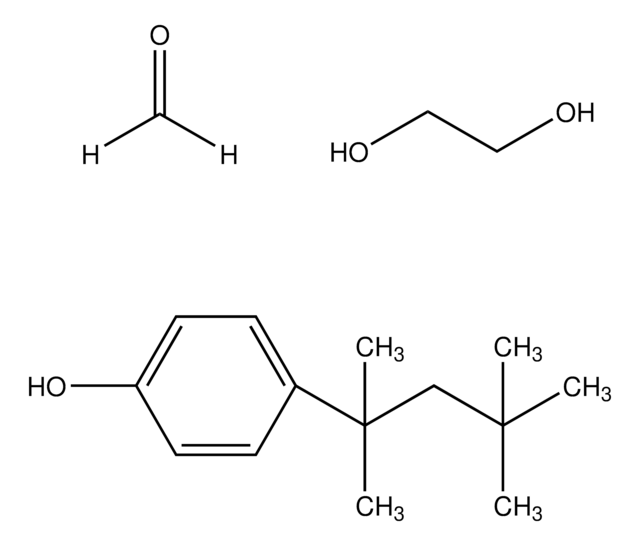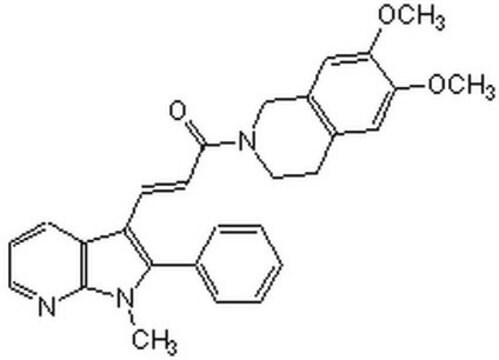T0307
Tyloxapol
BioXtra
Synonym(s):
4-(1,1,3,3-Tetramethylbutyl)phenol polymer with formaldehyde and oxirane
About This Item
Recommended Products
description
non-ionic
Quality Level
product line
BioXtra
impurities
<0.0005% Phosphorus (P)
ign. residue
<1.0%
CMC
0.018 mM
transition temp
cloud point 94.3 °C
anion traces
chloride (Cl-): <0.05%
sulfate (SO42-): <0.6%
cation traces
Al: <0.0005%
Ca: <0.0005%
Cu: <0.0005%
Fe: <0.001%
K: <0.005%
Mg: <0.0005%
NH4+: <0.05%
Na: <0.5%
Pb: <0.001%
Zn: <0.0005%
SMILES string
[H]C([H])=O.OCCO.CC(C)(C)CC(C)(C)c1ccc(O)cc1
InChI
1S/C14H22O.C2H6O2.CH2O/c1-13(2,3)10-14(4,5)11-6-8-12(15)9-7-11;3-1-2-4;1-2/h6-9,15H,10H2,1-5H3;3-4H,1-2H2;1H2
InChI key
GWJOFBXSBDVUMH-UHFFFAOYSA-N
Looking for similar products? Visit Product Comparison Guide
General description
Application
Signal Word
Warning
Hazard Statements
Precautionary Statements
Hazard Classifications
Eye Irrit. 2 - Skin Irrit. 2 - STOT SE 3
Target Organs
Respiratory system
Storage Class Code
10 - Combustible liquids
WGK
WGK 2
Flash Point(F)
235.4 °F - closed cup
Flash Point(C)
113 °C - closed cup
Personal Protective Equipment
Regulatory Listings
Regulatory Listings are mainly provided for chemical products. Only limited information can be provided here for non-chemical products. No entry means none of the components are listed. It is the user’s obligation to ensure the safe and legal use of the product.
FSL
Group 4: Flammable liquids
Type 3 petroleums
Hazardous rank III
Water soluble liquid
JAN Code
T0307-BULK:
T0307-5G:
T0307-VAR:
T0307-10G:
T0307-50G:
Certificates of Analysis (COA)
Search for Certificates of Analysis (COA) by entering the products Lot/Batch Number. Lot and Batch Numbers can be found on a product’s label following the words ‘Lot’ or ‘Batch’.
Already Own This Product?
Find documentation for the products that you have recently purchased in the Document Library.
Customers Also Viewed
Our team of scientists has experience in all areas of research including Life Science, Material Science, Chemical Synthesis, Chromatography, Analytical and many others.
Contact Technical Service













